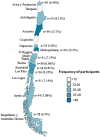Knowledge and attitudes of physicians in Chile toward Do-Not-Attempt-Resuscitation orders: A cross-sectional nation-wide study
- PMID: 38867717
- PMCID: PMC11168045
- DOI: 10.1177/20503121241259285
Knowledge and attitudes of physicians in Chile toward Do-Not-Attempt-Resuscitation orders: A cross-sectional nation-wide study
Abstract
Objective: Do-Not-Attempt-Resuscitation orders originated in the early 1960s with the establishment of advanced cardiopulmonary resuscitation. These orders aim to limit therapeutic efforts in cases where it may be futile. The decision not to resuscitate a patient is a process that involves a series of ethical, legal, and clinical considerations. Still, it also requires a process in which priority is given to the patients and their autonomy. The objective of this study was to describe the knowledge and attitudes of physicians working in Chile toward Do-Not-Attempt-Resuscitation orders.
Methods: A cross-sectional study was conducted, in which a digital questionnaire was sent to physicians from different regions of Chile. Quantitative variables were analyzed using measures of central tendency and dispersion (e.g., median and interquartile range), while qualitative variables were evaluated using frequencies and percentages.
Results: Four hundred and thirty-one physicians completed the survey. 85.4% were familiar with the ethical and legal guidelines for cardiopulmonary resuscitation and the rights and duties of the patient. 39.2% believed that patients should have the final decision Do-Not-Attempt-Resuscitation orders, especially if they themselves requested not to be resuscitated. 87.7% mentioned that the Do-Not-Attempt-Resuscitation orders should be reassessed if the patient's prognosis improves. In addition, it was found that the decision not to resuscitate was not always discussed with the patient or their family.
Conclusions: The study revealed an ethical conflict regarding Do-Not-Attempt-Resuscitation orders and their management by Chilean physicians. Therefore, it is necessary to create recommendations and provide training to guide professionals in this process, which should also involve patients and their families.
Keywords: Chile; Terminal care; hospice care; physicians; resuscitation orders.
© The Author(s) 2024.
Conflict of interest statement
The author(s) declared no potential conflicts of interest with respect to the research, authorship, and/or publication of this article.
Figures
References
-
- Emanuel EJ. Euthanasia. Historical, ethical, and empiric perspectives. Arch Intern Med 1994; 154(17): 1890–1901. - PubMed
-
- Knipe M, Hardman JG. I. Past, present, and future of “Do not attempt resuscitation” orders in the perioperative period. Br J Anaesth 2013; 111(6): 861–863. - PubMed
-
- Wagemans AM, van Schrojenstein Lantman-de Valk HM, Proot IM, et al.. Do-not-attempt-resuscitation orders for people with intellectual disabilities: dilemmas and uncertainties for ID physicians and trainees. The importance of the deliberation process. J Intellect Disabil Res 2017; 61(3): 245–254. - PubMed
-
- Thomas RH, Schuster-Bruce M. Do not attempt resuscitation orders, ethics and the Mental Capacity Act. Br J Hosp Med (Lond) 2011; 72(5): 259–263. - PubMed
-
- Fritz Z, Fuld J. Ethical issues surrounding do not attempt resuscitation orders: decisions, discussions and deleterious effects. J Med Ethics 2010; 36(10): 593–597. - PubMed
LinkOut - more resources
Full Text Sources


